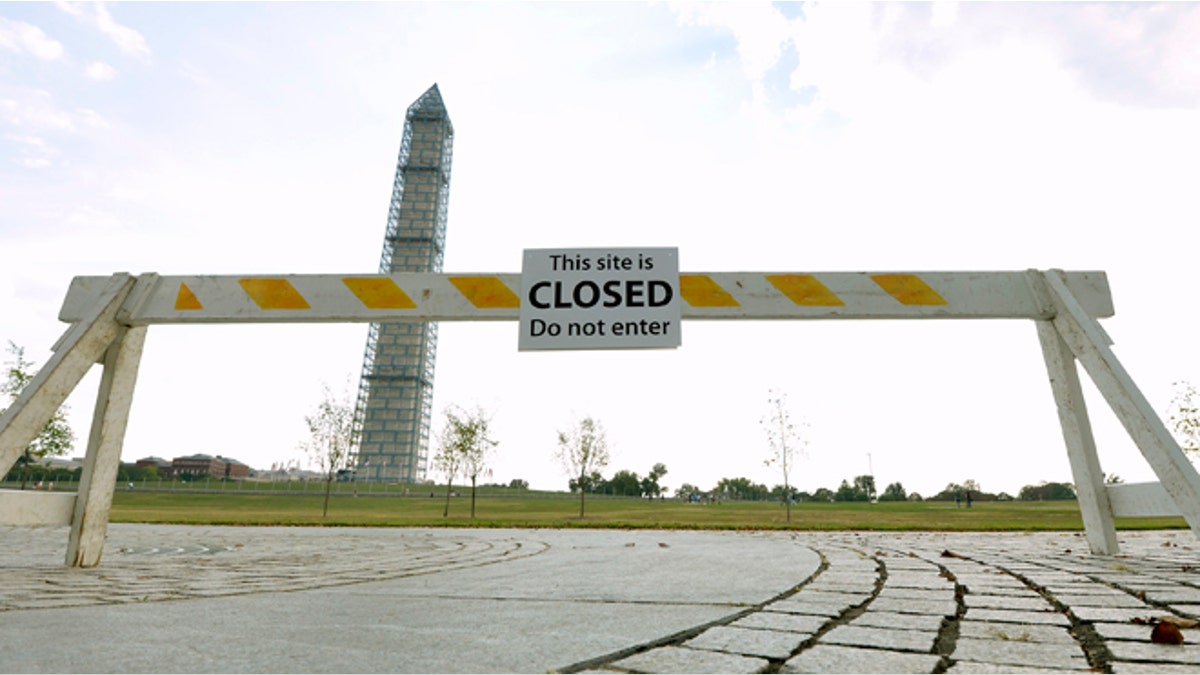
A barrier sits near the Washington Monument. (Reuters)
The government slimdown, known in some quarters as the so-called “shutdown” hasn’t lived up to the disastrous predictions.
Federal government spending has been cut by 17 percent from the scheduled increase for the 2014 fiscal year. It is only a 13 percent cut from what was being spent during 2013.
Even the final cut will be much less than these percentages since furloughed workers are extremely unlikely to lose anything.
The overall reduction is not large when considering that during the last 4-and-a-half years government spending has grown by 21 percent.
In other words, today, even during the temporary and partial government shutdown, we are spending more than when President Obama took office. Do Americans really believe that their lives are so much better off from the increased government spending?
[pullquote]
And almost all that 13 or 17 percent reduction could be avoided if the Senate passed the eight mini-spending bills already passed by the House. Those bills cover such varied programs as Veteran Affairs, the Federal Emergency Management Agency, and the Supplemental Nutrition Program for Women, Infants and Children.
No doubt the Obama administration has tried to make many cuts very visible and painful to average citizens. Amber alerts were unavailable for a week to help find abducted children, though the Obama administration on Monday changed their minds.
The American Forces Network for our military may be saving money by not broadcasting the Major League Baseball playoffs, but they seem to have the money to keep Al Hurra TV, the small government-funded Middle Eastern network, on the air. Which do you think that our soldiers in Afghanistan would rather be watching?
Friday the Senate Commerce Committee helds hearings over how the “slimdown” is impacting the Alaska crab-fishing season, which is scheduled to begin next Tuesday.
Democrats want to use this as a prime example of the hardships created by the “slimdown,” but it is actually more an example of the Obama administration going out of its way to cause trouble.
Without the National Oceanic and Atmospheric Administration (NOAA) determining how many crabs can be caught this season, no licenses can be issued.
But the permit handler’s salaries are entirely paid by private license fees and if the administration treated this properly, the permit handlers should never have been furloughed.
The arbitrary furloughs are not the fault of Congress. Obama and his appointees have huge discretion in how to spend money. "[W]hat is open and what is not open is largely at the discretion of the president and the heads of the given agencies throughout the federal government," notes John Hudak, a fellow in Governance Studies at the Brookings Institution.
If it wasn’t for these obvious attempts to make the cuts as painful as possible, Democrats biggest concern might be that the cut in government spending might go unnoticed.
When then Senator Obama was running for the presidency in 2008, he repeatedly complained that government was too large: "we have had over the last eight years the biggest increases in deficit, spending, and national debt in our history . . . , but actually I'm cutting more than I'm spending so that it will be a net spending cut."
Indeed, as Obama himself claimed, it was a promise he made continuously during the campaign: “Now, what I've done throughout this campaign is to propose a net spending cut.”
President Obama ought to seize the opportunity and make good his promise to cut spending. But instead of choosing to cut programs that produce the most pain, he should cooperate with the Congress and chose those areas where less government would be welcome.




















